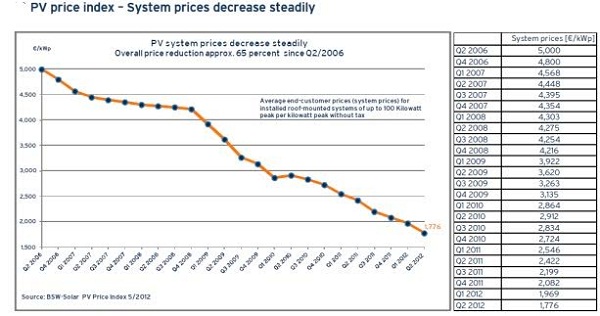
In the last ten years of his life, solar power champion Hermann Scheer, who died on October 14, 2010 at the age of 66, was to revolutionise the very role of non-conventional energy in the world. He was an electrical engineer, but espoused the cause of solar because he was convinced that the clout of the oil and gas industry was more because of politics, not economics or even technology.
He was aware of the hundreds of billions of dollars of subsidy that the oil and gas industry had benefited from for several decades. If even a fraction of this could be given to the solar industry, it would become vibrant and even more relevant that many people thought was possible.
Today, Germany is the world’s top photovoltaic (PV) installer. By December 2012, Germany had an installed capacity of over 32.3 GW of PV installation. And almost every energy specialist is convinced that solar power will achieve grid parity before 2017.
But Scheer engineered this transition by adopting a revolutionary strategy that few could imagine. Much of it is best explained in a 48-minute TV programme that can be viewed at http://www.youtube.com/watch?v=mLHBFyfvK8A. He introduced an ingenious policy to encourage rooftop solar.
Aware that common folk would not take the trouble of both installing and maintaining solar panels on their rooftops, Scheer introduced laws that would allow an agent to put up the solar panels on rooftops at highly subsidised prices. The house-owner got the benefit of using the solar power produced from his rooftop free of cost. If there was some power left, the householder could sell the surplus power to the agent and thus make some money himself.
The agent thus played three roles: he was the installer; he maintained and serviced the solar panels; and, most important, he played the role of aggregator – collecting small amounts of power from individual houses, ‘smoothening’ out the inconsistencies in energy flow and then selling the ‘consolidated’ power to the grid.
In turn, the agent got volume-based commission, attractive enough to cover his costs for installation and maintenance and also leave him with reasonable surpluses.
The aggregator thus became the market-maker. In order to make more profits, he encouraged his team to come up with innovations that could generate more and cheaper solar power. That is how plastic reflectors to focus weak sunlight on rooftops became popular and cheap.

The unexpected result was that, in ten years, Germany had more people working in the solar industry than in the automobile sector.
The other (intended) consequence was that Germany generated a huge demand for PV which aided mass production. PV prices tumbled from over $5 per watt of installed capacity to just under $1. More innovation meant better conversion rates, hence juicier profits.
India has more sunlight than Germany. It has more people, hence more houses. So why have India’s policymakers not pushed rooftop solar more aggressively?
@rnbhaskar1